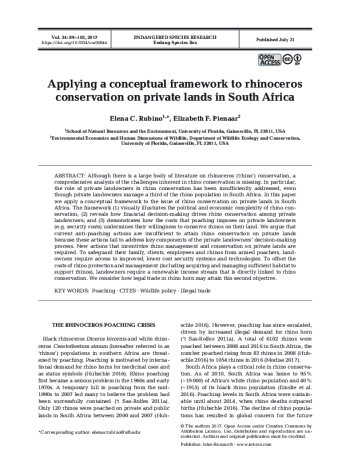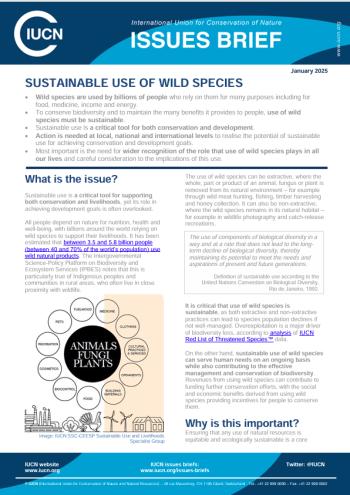
Applying a conceptual framework to rhinoceros conservation on private lands in South Africa
In this paper
we apply a conceptual framework to the issue of rhino conservation on private lands in South Africa. The framework (1) visually illustrates the political and economic complexity of rhino conservation; (2) reveals how financial decision-making drives rhino conservation among private landowners; and (3) demonstrates how the costs that poaching imposes on private landowners (e.g. security costs) undermines their willingness to conserve rhinos on their land. We argue that current anti-poaching actions are insufficient to attain rhino conservation on private lands because these actions fail to address key components of the private landowners’ decision-making process.
Rubino, Elena & Pienaar, Elizabeth. (2017). Applying a conceptual framework to rhinoceros conservation on private lands in South Africa. Endangered Species Research. 34. 89-102. 10.3354/esr00844.
-

Prof Elizabeth Pienaar
Research Fellow (2019-2021) -
Elena Rubino
We support the free flow of information. Please share:
Form coming soon
Related Content
-

-

Review of African Social and Economic Development Volume 1
ByIbrahim Bàbátúndé Anobaarrow_forward2024 -

Economic Analysis: Climate Change and Wildlife Utilization on Private Land
ByJackson OtienoEdwin Muchapondwaarrow_forward2015
Get updates by email
Through impactful research, stakeholder engagement, and professional development, AWEI is supporting the wildlife economy across Africa. Please subscribe for occasional updates on our work and forthcoming events.
Sign up for a quarterly dose of AWEI insights
In a complex and changing world, AWEI generates strategic ideas, conducts independent analysis on wildlife economies, and collaborates with global scholar-practitioners to provide training and expertise for biodiversity conservation, climate resilience, and inclusive economic opportunities in Africa.
